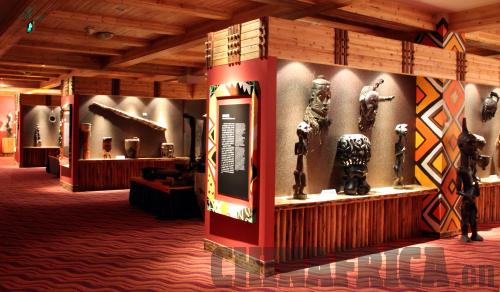|
 |
|
ZNU's African Museum is the first of its kind on the Chinese mainland, and showcases African art and culture (COURTESY of ZNU) | The Institute of African Studies at Zhejiang Normal University (ZNU) also excels in African studies among Chinese universities. It launched the First China-Africa Think Tanks Forum in 2011 and the second meeting was successfully held in Bishoftu, Ethiopia last October. This initiative has created a shared platform for dialogue and exchanges between Chinese and African think tanks.
China's first Africa-oriented business school was established at ZNU in 2010. The school enrolls students for master's degrees in China-Africa Business Management, and also provides vocational training for African enterprises in China and Africa-based Chinese enterprises. "The school is aimed at training professional business management personnel who understand both Africa and China," said Wu Fengmin, ZNU's President.
ZNU's African Museum is the first of its kind on the Chinese mainland and showcases African art and culture. More than 500 pieces of various traditional African artworks are on display. It is open to the public on Saturdays and Sundays, and attracts many visitors.
Apart from PKU, ECNU and ZNU, other Chinese universities also set up centers for African studies with different focuses based on their own academic superiorities. For example, the Center for African Laws and Society at Xiangtan University focuses on the study of African laws, while the Institute of African Studies at Nanjing University excels at researching African geography and agriculture.
In addition, since the Ministry of Education launched the 20+20 Cooperation Project for China-Africa Universities in 2010, 40 Chinese and African universities (20 on each side) have worked together and conducted exchanges in a wide range of areas, including agriculture, education, law and sciences. The cooperation has integrated the academic resources of the universities from the two sides, providing an academic platform for joint research and cooperation.
Practical significance
China's research institutions dedicated to Africa are also working to maintain a balance between their academic research and the practical significance of their research findings.
"People have realized that more cooperation between practical work and academic research is needed, since the government needs information, analysis and assessment, while academia needs funding, stimulus and feedback," Li Anshan noted.
Sun Baohong echoes Li's view. "Scholars' research findings offer guidance for diplomatic work, especially in the area of African affairs," she told ChinAfrica.
The Chinese Government also attaches great importance to the academic research on Africa. "China will continue to implement the China-Africa Joint Research and Exchange Plan to sponsor 100 programs for research, exchange and cooperation by academic institutions and scholars of the two sides," said Chinese President Hu Jintao at the Fifth Ministerial Conference of the Forum on China-Africa Cooperation in July 2012.
Exchanges and interaction between the Chinese Government and academic institutions have strengthened. According to Li, some government departments, such as the Ministry of Commerce and the Ministry of Foreign Affairs, hold consultation meetings on a regular basis to seek advice from experts. Scholars' research findings also guide policymakers' decision-making. CA |